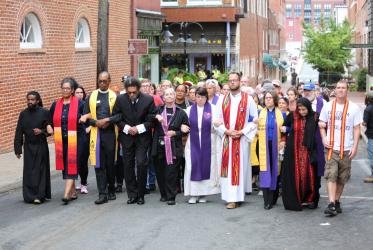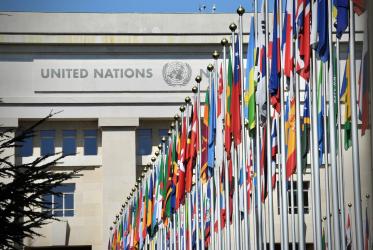Speakers explored the intersectionality between statelessness and racial discrimination. In many countries of the world, entire communities have been denied citizenship or been stripped of their citizenship, only because of their race or national descent. In most of these cases, deprivation of nationality has been applied to minority groups who have been living in the country for generations, rendering them stateless without even crossing an international border.
Rev. Dr Hans Ucko, Church of Sweden, who moderated the discussion, shared his personal experience being born stateless and reflected on statelessness around the world. “The importance of the existence of statelessness does not have to be argued for this conversation,” he said. “Statelessness comes in numbers from several hundred thousand to tens of thousands,” he said. “Together, they are millions. It is more difficult to see the individual stateless. You only see the forest and not the single tree. Sometimes it is good to focus on a single tree.”
Ana Maria Belique, a stateless woman and founder of RECONOCI.DO, shared how a 2013 constitutional court decision retroactively deprived of their nationality generations of Dominicans of Haitian descent who have been living there since a century. When asked how the COVID-19 pandemic affected already marginalized stateless communities, lack of documentation hindered many from benefiting from the governmental response to the pandemic, including the vaccination campaigns.
Prof. Fernand de Varennes, UN special rapporteur on Minorities, underscored that statelessness, which mainly affected minority groups, has not ended. “Statelessness has not been decreasing,” he said. “Statelessness actually has not even stagnated —it’s increasing.”
Other speakers, who included UNHCR and the Institute on Statelessness and Inclusion, also spoke on how state sanctioned discriminatory citizenship practices are not a new phenomenon, and explored how the perceived tension between state prerogative in determining who belongs to its citizenry and the right of every person to a nationality can be addressed.
The webinar was also the opportunity to launch the second volume of “I Belong: Biblical Reflections on Statelessness.” This latest collection presents new perspectives, including indigenous voices and reflections on the meaning of land. The texts are designed as discussion tools for Bible studies in congregations and communities around the world.
Access the Publications: I Belong Volume 2









